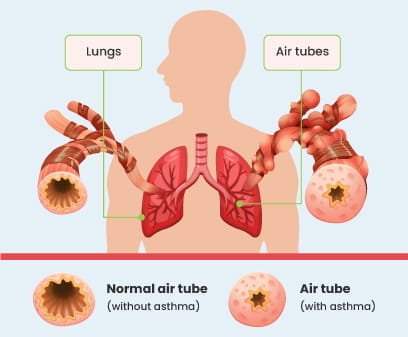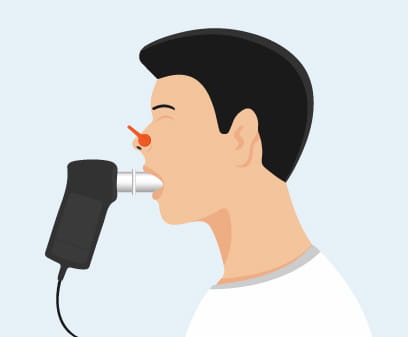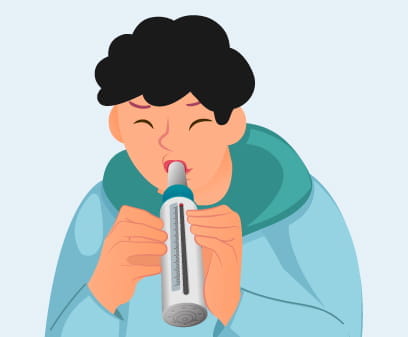What is asthma?
According to the World Health Organization (WHO), asthma is a chronic (long-term) lung condition affecting children and adults with symptoms such as cough, breathlessness, tightness in chest.
These symptoms can range from mild to severe and may vary over time.
Asthma stands out as a major health concern in India, with around 34.3 million people been affected.
This represents about 13.09% of the total cases of asthma in the world.1,2.

What happens in asthma?
In asthma, the airways of your lungs may get narrowed and inflamed, thus making it difficult to breathe out the air and causing you symptoms like coughing, wheezing, breathlessness, or r tightness in your chest. Many triggers can make asthma worse, like infections, dust, smoke, pollen, or even strong smells. While what causes asthma is unknown, one can still treat it to help control the symptoms and make breathing easier.1,3.
Signs and symptoms of asthma
Not everyone has all the symptoms, but many people may experience the following:

Persistent cough that gets worse by infections, more at night, or is triggered by exercise allergens (pet fur, mold, fungus etc)

Chest tightness or discomfort in the chest, which may increase during physical activity

Wheezing or whistling sound when you exhale. High-pitched whistling sound that occurs when breathing. It is caused by narrowed airways

Breathing problems like shortness of breath, rapid breathing, or gasping for air
Asthma symptoms can appear at specific times, like when you exercise or when you're around certain triggers. Generally, symptoms of asthma increase at night or early in the morning. Interestingly, changes in weather may also trigger your asthma symptoms. For instance, in winter, breathing in cold, dry air can dry out and irritate your airways, whereas in summer, hot, dry air can narrow your airways and trigger asthma symptoms 1,12
Being aware of symptoms of asthma may help you reach out to your doctor at an early stage for further diagnosis and assessment.1
Triggers of asthma
Asthma symptoms can be triggered by various factors, including respiratory infections, allergens, chemical irritants, environmental factors, and physical activity. To prevent symptom flare-ups, individuals with asthma should avoid triggers whenever possible. Taking treatment as prescribed by a doctor can help reduce symptom frequency.
Along with medicines, appropriate exercise can also reduce symptoms and improve the quality of life in people with moderate and severe asthma. However, it's recommended to talk to your doctor before starting any exercise routine. By avoiding triggers and following prescribed treatments, individuals can better control their asthma and improve their quality of life1

Viral Respiratory Infections

Environmental Factors (Soybean dust, Fungal spores)

Allergen Exposure (Pet fur, fungus, molds)

Food Allergies

Exercise

Outdoor Air Pollution

Seasonal Changes

Not Taking Medication Properly

Asthma Epidemics

Chemical Irritants (Exhaust fumes, smoke etc)
What is an asthma attack?
An asthma attack is when your asthma symptoms suddenly get worse. It can happen slowly over hours to days or very quickly, within seconds to minutes.
You might start feeling mild symptoms that gradually get worse. But sometimes, your symptoms can escalate rapidly, which is what most people think of as an asthma attack.
Depending on how bad your symptoms are, it could be called a severe or even life-threatening attack.4
Risk factors of asthma attack
Several factors might make it more likely for someone to develop an asthma attack:
.svg?updated=20241115073615)
Previous Severe Attack
.svg?updated=20241115073624)
Exposure to Smoke & Other Irritants
.svg?updated=20241115073629)
Not taking medicines regularly
.svg?updated=20241115073636)
Obesity
.svg?updated=20241115073649)
Food Allergies (Preservative, potatoes, shrimp, dried fruits, beer, and wine etc)
.svg?updated=20241115073656)
Allergen Exposure (Pet dander, Mold, Dust mite and Insects)
Asthma diagnosis and tests
When diagnosing asthma, doctors have a process they follow to figure it out. Here's what you can expect:
- Knowing Patient & Family History: Your doctor will ask if you had breathing problems as a child or if you have a cold, eczema, or a family history of asthma or allergies; if such exists, you are more likely to have asthma. However, it's important to note that symptoms and a family history may not specifically indicate asthma. By giving your doctor the information about your symptoms and health history, you can help them make the right diagnosis and choose the best treatment for you. Hence, further investigation may be required to confirm the diagnosis.
- Physical Examination: During a physical exam for asthma, the most common symptom detected by a doctor is wheezing, which is heard using a stethoscope when the patients breathe.
- Diagnostic Tests: Your doctor may recommend the following test if they suspect you have asthma1,11.

Spirometry
In this test, you will be instructed to take a deep breath and exhale in the mouthpiece called a spirometer to check how fast & how much air your lungs can breathe out.

Peak Flow Meter
The test is performed by holding the device in front of your mouth. You will be instructed to take a deep breath, hold it briefly, and exhale as strongly as possible inside the mouthpiece.
In some cases, along with these tests, your doctor may also suggest some additional test for a better diagnosis.
Consequences of asthma attacks
Receiving the appropriate treatment can help prevent these issues, both immediately and over the long term.1,5
Asthma can make breathing hard, making it difficult to sleep or do everyday tasks.
During asthma attacks, you may need to take time off from work or school.
Over time, asthma can lead to a permanent narrowing of your airways, making it harder to breathe.
Severe asthma attacks may require emergency room visits or even hospital stays.
Some medications used to manage asthma attacks can have long-term side effects.
Management of asthma
If you have asthma that bothers you often, it's important to work closely with your doctor to create a plan to manage it.
This plan will involve two key aspects:
.svg?updated=20241115073417)
Avoiding Asthma Triggers
Asthma triggers are different for everyone, but it's important to figure out what yours are and avoid them so you don't have as many asthma symptoms.
.svg?updated=20241115073422)
Regular medication
Adherence to treatment plays a crucial role in asthma treatment and often involves inhalational therapy9.
Types of medications in asthma

Maintenance
Long-term medication used to reduce inflammation in the airways, control symptoms like wheezing and shortness of breath, and lower the risk of flare-ups and decline in lung function. Once or twice a day (Should be taken as recommended by a doctor).

Reliever
You can also use the reliever inhaler before exercise to prevent breathing problems caused by exercise1.
Relievers are for when you're having trouble breathing and need quick relief. Helps you breathe easier during flare-up or attacks.
Inhalation therapy
Inhalation therapy treats asthma by using inhaler devices that deliver medicine straight to your lungs. This helps your lungs to function better and reduces symptoms like coughing and wheezing.
Different types of inhalational therapies include:
Types of inhalational devices
.svg?updated=20241115073410)
BAIs are new-age inhalers that automatically release the drug when the child breathes in.
.svg?updated=20241115073349)
pMDIs contain the drug along with a propellant in a liquid or gaseous form, and the child has to inhale the medicine slowly and deeply. Add-on devices like spacers or masks may be beneficial for patients who are unable to use their pMDIs correctly.
.svg?updated=20241115073402)
In patients who are unable to use the inhalers, nebulizers convert the drug in a liquid form into a mist that can be used as a treatment option.
.svg?updated=20241115073356)
DPIs contain the drug in a powder form, and the user has to inhale deeply and forcefully to get the medicine into the lungs.
Inhalers and nebulizers are the two main types of devices used for inhalation therapy. They work quickly because the medicine goes straight to your lungs, unlike pills, which take longer to work and can have more side effects.
Overall, inhalation therapy is the preferred choice for asthma over others because it works fast and gets the medicine right where it's needed7,11.
By following your treatment plan, you will have fewer asthma symptoms and lead a better quality of life.1
Monitoring of asthma
Monitoring asthma is important to see how well your symptoms are controlled and your medications are working. The peak-flow meter is used to monitor and keep track of symptoms. After evaluation, it is important to keep the device clean for individual use1,8.

Asthma action plan
Working with your child's doctor to create a written plan for managing their asthma in case of severity is During an asthma attack, it's important to have a plan ready. An asthma action plan is a guide that helps people manage the symptoms of asthma from getting worse. This plan should have clear steps on what to do during an emergency, like how to take medicine and who to call for help. Make sure your family and friends know about this plan, so everyone is ready to help if needed.6
If experiencing symptoms:

Sit upright and loosen your clothing

Use a prescribed reliever inhaler promptly

If you still don't experience relief, seek medical assistance immediately without exceeding the prescribed inhaler dosage

What other than medicines?
The goal of treating asthma is to keep asthma under control. This involves improving symptoms, lowering the risk of going to the hospital, stopping the lungs from worsening and minimizing side effects from asthma medications.
Lifestyle choices significantly impact asthma control

Balanced Diet
Include milk, salmon, and almonds. Avoid canned and processed foods.

Cycling & Swimming
Strengthens the lungs and muscles.

Exercise
Engage in activities like walking and low-impact cardio, keeping inhalers handy.
Consult your doctor before initiating an exercise regimen.
Before starting any physical activity, seek medical advice.

Yoga
Certain poses and breathing exercises enhance lung function.
Exercise can be really beneficial for your health, but for some people with asthma, it can sometimes cause asthma symptoms to flare up. That's why it's important to have a discussion with your doctor before starting any exercise program. They can help you choose the right exercises for you and provide guidance on what to do if you experience asthma symptoms during exercise. Ensure regular asthma treatment to achieve and maintain control for an improved quality of life.10
Reference
- Global Initiative for Asthma. Global Strategy for Asthma Management and Prevention [Internet]. 2024. Available from:Click here
- Singh M, Sundeep V, Singh. Early View Prevalence, time trends and treatment practices of asthma in India: Global Asthma Network study. Available from: Click here
- National Heart, Lung, and Blood Institute. What Is Asthma? [Internet]. www.nhlbi.nih.gov. National Heart, Lung, and Blood Institute; 2022. Available from: Click here
- Asthma Flare-Ups & Attacks [Internet]. Asthma Australia. Available from: Click here
- Mayo Clinic. Asthma - symptoms and causes [Internet]. Mayo Clinic. 2022. Available from: Click here
- Create an Asthma Action Plan [Internet]. www.lung.org. Available from: Click here
- Cataldo D, Hanon S, Peché RV, Schuermans DJ, Degryse JM, De Wulf IA, et al. How to Choose the Right Inhaler Using a Patient-Centric Approach? Advances in Therapy [Internet]. 2022;39(3):1149–63. Available from: Click here
- Xepapadaki P, Adachi Y, Pozo Beltrán CF, El-Sayed ZA, Gómez RM, Hossny E, et al. Utility of biomarkers in the diagnosis and monitoring of asthmatic children. World Allergy Organization Journal [Internet]. 2023 Jan 1;16(1):100727. Available from: Click here
- Asthma Guide: Causes, Symptoms and Treatment Options [Internet]. Drugs.com. Available from: Click here
- Nunez K. All About Asthma and Exercise [Internet]. Healthline. Healthline Media; 2020. Available from: Click here
- Indian Medical Association. Recommendations on Management of Asthma in Primary Care (2020). 2020 Dec 22;1–28
- Asthma, Wellness H &, Copd, Air H, Diseases LH and, Science. Weather and Your Lungs [Internet]. www.lung.org. Available from: Click here
- Non-Allergic Asthma. ACAAI Public Website. Available from: Click here
